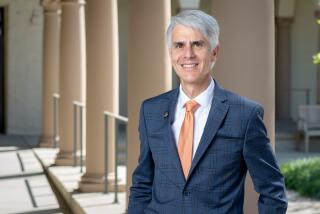A Corps of Retired Execs Teaches College a Lesson
- Share via
This time, the college was flunking.
Enrollment at the prestigious, picturesque Pacific Oaks College and Children’s School in Pasadena was declining. So was income. Decisions made within the courtesy of consensus had slowed planning to the point of paralysis. School needs--higher salaries, simplified priorities, academic rigor, fiscal controls and institutional research--were endless.
A somber report by a three-person accreditation team from the Western Assn. of Schools and Colleges concluded: “There will need to be some profound changes in attitude and process in order to seek resolutions and orderly planned action for the future.”
A school executive, in retrospect, was a little more dour: “Had nothing been done, it (Pacific Oaks) would have ultimately muddled its way down the tubes.”
Turned the Books Around
But something was done. Shaken by the 1985 report, the school’s board of trustees formed a long-range planning committee. A new chairman, a president and a dean of the school were chosen. Work began on a faculty evaluation process, handbooks on policies and procedures, stiffening business services. . . .
And last year, the school capped its comeback by tapping into a vital cabinet of corporate talent: the Executive Service Corps of Southern California, an all-volunteer, nonprofit organization of 225 retired senior executives.
Two corps consultants were offered Pacific Oaks. For six months they explored it and delivered written recommendations.
“They had a major impact,” said Katherine Gabel, who assumed presidency of the campus at the height of its troubles. “We could have done it without them, but it would have taken us longer, with less insight and more pain.
“They’ve been a tremendous, positive, motivational force in a very tough organizational change process. I think we’ve turned the corner and they helped us to turn that corner and stabilize through perspective and humor that was sorely needed.”
Lofty Careers
Such references have become typical for the Executive Service Corps whose members have worked high and successful careers--commonly as vice presidents, often as chief executive officers--with the megagiants of Southern California business.
Now, in retirement, they have time to give back--by pouring combined centuries of their expertise in accounting, personnel, board governance, marketing or public relations into the nonprofit and constantly struggling organizations of Los Angeles, Orange and Ventura counties.
“We have two things going for us here,” noted Jack K. Horton, chairman of the executive committee, Southern California Edison Co., and chairman of the corps’ board of directors. “One, the great (retired executive) talent pool we have here; and two, the flock of nonprofit organizations in Southern California.
“Sure, they (nonprofit organizations) need money. But, in my judgment, what they need more is management advice. And that we can supply.”
Since 1981, more than 125 nonprofit groups in Southern California have been assisted by the Executive Service Corps.
Last year, Horton said, the value of those executive services, rendered on the organization’s privately funded budget of $165,000, was $1.3 million for “a leverage factor of nearly 8-to-1 on the investment made by our funders.”
In more human terms, however, that translates to aid to ADEPT (Assisting the Disabled with Employment, Placement and Training) and a boost to the business of the Back Alley Theater. The Capistrano Valley Symphony is on the corps’ client list of organizations. So is the Coalition Against Household Violence, the Vietnamese Community of Orange County, Inc., and Providence Speech and Hearing Clinic.
Propping Up Castles
Praised the Walden School of Southern California: “Thank you for helping us put foundations under our castles in the air.”
Said the Travelers Aid Society of Los Angeles: “What Executive Service Corps provides is an excellent service at a bargain price.”
Those bargain prices range from $100 to $1,500 depending on the financial state of the organization. It’s a one-shot fee no matter how long the counseling. But if obtained from a commercial counseling service, corps officials say, their advice would cost an average of $110 an hour.
The benefit, however, is far from unilateral.
“We also provide an opportunity and a challenge to those capable people (retired executives) who have reached the time that some people call ‘legislated senility,’ ” Horton added. “They’re anything but that . . . so while we provide a helluva service to the nonprofit organizations, we also provide a helluva service to those individuals who need to do something for their own self-esteem.”
The work may even be keeping retired executives alive. “In seven years,” Horton said, “we’ve only lost three or four consultants.”
Resentment Toward Advice
It is not always simple service. Outside advice can, in fact, be resented by the organization that requested that advice.
“It’s a delicate balance . . . to turn the organization in the direction of more business-like methods without losing the human touch and appeal that is their reason for being,” explained the corps’ executive director, Robert C. Lewis.
The Executive Service Corps does not assist fund raising. Nor will it lobby for an organization. Profit organizations are referred to the Service Corps of Retired Executives Assn., a national, federally-funded group sponsored by the Small Business Administration.
Pacific Oaks--founded as a community school by seven Quaker families in 1945, now a private college offering studies in human development with emphasis on childhood education--fell within all the necessary parameters.
Although a nationally respected institution, said president Gabel, “it was beginning to wander a bit from its original mission of early childhood development and education.
“It was wandering into gerontology, women’s studies. The effect is, if you’re very small and get too broad, you don’t have the depth of program.”
More Minds Are Better
Enter, at Gabel’s suggestion and written application, the Executive Service Corps because “the group mind is far better than any individual’s mind when you’re enmeshed, embattled and trying to solve a complicated problem.”
Last year, the corps chose its consultants.
One was former California GOP Rep. Victor V. Veysey of Pasadena, one-time assistant secretary of the Army and now director emeritus of the Industrial Relations Center at Caltech. The other was Robert A. Lamb, a 38-year veteran of Unocal and manager of its accounting research department until early retirement in 1986.
Lamb first looked at Pacific Oaks’ books.
“I found a mess,” he said. “They did not have an accounting system, personnel were not qualified for the job, there was no cash flow, no general ledger. . . . It was fly by the seat of your pants and in all my years, I’d never seen worse.
“Some accounts receivable were two or three years old and hadn’t been dunned, if that’s the word.”
Veysey was similarly unimpressed.
“Pacific Oaks had (experienced) demonstrations and a strike and a fire that probably was arson,” he said. “There were lawsuits outstanding.”
Veysey and Lamb spent five months probing and interviewing and examining before joint authorship of a 45-page report delivered to Gabel and the school’s trustees.
“It was received extremely favorably by the board,” Gabel said. “To me, the report was right on. We didn’t feel criticized or attacked. We felt assisted and complimented.”
Veysey and Lamb made a dozen recommendations that included the appointment of a controller, establishment of financial controls for handling deficit and cash shortfalls, a revision of personnel policies with particular regard to salaries and contracts, and the careful management of internal change.
“All we did was recommend,” Veysey said. “The acceptance or rejection was up to them.”
According to Gabel, the school had already “put the foundation in place” by establishing a research center to publish papers and by seeking a grant to obtain computers, but “they (Veysey and Lamb) gave us impetus and further ideas and clarification.”
Said Lamb: “They’ve raised the tuition, they’ve got more students and a better fix on their faculty. I don’t think there’s any question that they will survive.”
Survival, however, hinges heavily on accreditation.
This month, the Western Assn. of Schools and Colleges returned to reassess Pacific Oaks against its criticism of 1985.
‘Healthy Organization’
“They said the sun is shining and we’re a very healthy organization,” said Gabel. “They said we have a tight foundation within the tapestry we have woven and that we should grow well.”
Yet Veysey, Lamb and the Executive Service Corps aren’t done with Pacific Oaks.
For the corps has a Board Bank that, to date, has placed 25 retired executives on the boards of assisted organizations.
Recently, Veysey and Lamb were elected to the board of trustees of Pacific Oaks College.
“It gave the board a great shot in the arm to think that these fine, professional men wanted to be part of us for the next three-year term,” Gabel said.
More to Read
Sign up for Essential California
The most important California stories and recommendations in your inbox every morning.
You may occasionally receive promotional content from the Los Angeles Times.










